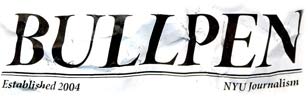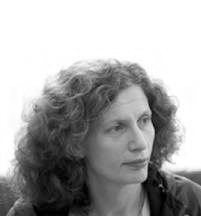Lecture: Beth Harpaz
RELATED:
"In my family, I'm the defender of the media," Beth Harpaz told a group of students in NYU's journalism department on November 4, 2004. "Pour it on me; I'll defend the media 'til the day I die." Having covered an election herself, Harpaz thought the coverage of the 2004 presidential elections was done well.
From 1998 until 2000, when she was a reporter for the Associated Press, Harpaz followed Hillary Clinton on the campaign trail during Clinton's bid for the U.S. Senate. Harpaz recounts that journey in her book The Girls in the Van (whose title is a nod to Timothy Crouse's '70's bestseller, The Boys on the Bus).
She shared with the students her favorite quote from The Boys on the Bus, which she included in her book:
The reporters followed the candidate everywhere, heard his standard speech so many dozens of times they could recite it with him, watched his moods go up and down, speculated constantly on his chances, wrote songs about him, told jokes at his expense, traded gossip about him, and were lucky if they did not dream about him into the bargain.
"Twenty-eight years later," noted Harpaz, "about the only difference I saw was that our candidate was a woman—a woman whose staff and whose press corps was more than half female. We were no longer the boys on the bus; if anything, we were the girls in the van."
Whether male or female, journalists serve three purposes, in Harpaz's opinion: they entertain, they inform, and they serve as watchdogs of power. "It goes back to the constitution, the founding fathers," she said.
"You have to maintain a good relationship with [a candidate's PR people] because you need access to the candidate, you need your phone calls returned when you're on deadline, you need that quote, you need that one-on-one interview, you need a heads-up when the campaign changes their schedule. [B]ut on the other hand...you're not working for the campaign. It's a very delicate dance."
She described the job of a journalist in lofty terms. "You feel like you are standing in for all citizens, all the voters, that can't be there that day [to hear the candidate speak]," she said. "It's your job to come away with the info that's going to help voters [make an informed decision] on Election Day."
When covering a candidate, Harpaz tries to maintain objectivity by using two criteria: Was her story factual, she asks herself, and did she show both sides of every issue, every event? "I always try to step back and do that two-part check," she said. However, telling both sides of a story does not mean that a reporter should fall into the "he said, she said" trap, said Harpaz. The best "political journalism has gotten beyond quoting what a politician said and [what] the opposition said," she noted. In her opinion, journalists are "actually adding some fact-checking and context," rather than just reporting the "he said, she said" side of the story, and leaving it at that.
However, given the speed at which most stories are cranked out in a busy newsroom, journalistic ideals of fairness and balance sometimes get trampled underfoot. When a reporter is trying to scoop the rest of the pack, the race goes to the swiftest, said Harpaz. "Basically, if you cover something for the AP and you're not calling in within a few minutes of the time the event is over, they think some terrible thing happened to you," said Harpaz. "Speed is what it's all about."
Harpaz blames the media industry's addiction to speed on the 24/7 news cycle, which she believes is rooted in consumers' hunger for instantaneous information. "The audience that's out there has come to expect a quick turnaround for print journalists," Harpaz noted. "They'll see a clip of it live on [TV] and then they'll go to the Internet to look for the story. It can take about 10 minutes [to post a story online] but people expect it instantaneously."
In addition to the pressure to be the first to file a story, flak from a candidate's public relations people also makes it difficult to maintain one's objectivity, observed Harpaz. "You're trying to tell both sides, you're trying to be fair, you're trying to say what you saw of course the campaign has an agenda," she said. At the same time, the candidate's PR people "want to get their candidate elected" so "they want your story to be as flattering as possible." If a journalist reports the candidates' screw-ups or adopts an unflattering angle on a story, the journalist will likely get confronted by the candidate's PR operatives, she claimed.
"You have to maintain a good relationship with [these people] because you need access to the candidate, you need your phone calls returned when you're on deadline, you need that quote, you need that one-on-one interview, you need a heads-up when the campaign changes their schedule," said Harpaz. So "you can't afford to alienate that [public relations] person, but on the other hand...you're not working for the campaign. It's a very delicate dance."
When Hillary runs for her U.S. senate seat again or even if she runs for president one day, Harpaz won't cover either campaign, she said. "I think the AP wouldn't let me even if I wanted to, because they sort of feel like I'm tainted now that I've written a book," she confided. "I can no longer maintain the thinnest veneer of objectivity, now that my opinions about everything from Hillary's color choices to her accent are in print."
Besides, after covering a senatorial campaign and writing two books, Harpaz was looking for something more uplifting to cover than politics. In the mood for more upbeat stories, she took the position of AP travel editor last year.
When Harpaz talks about journalism as a noble calling, she's not talking exclusively about covering celebrity politicians and other pillars of the power elite. "There are many, many stories of reporters who got their first good story from actually reading the budget from the board of education of some small town, [in a situation where] no one else had bothered to read it except for the head of the committee," she said. "You may be the only person in the room besides the members of that body, [so] you are the watchdog of power, even [a] small branch of power."


